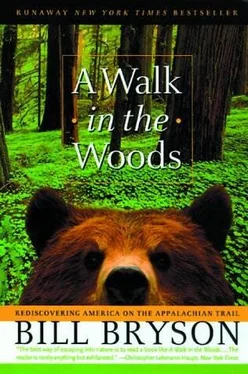Bill Bryson - A Walk In The Woods
Здесь есть возможность читать онлайн «Bill Bryson - A Walk In The Woods» весь текст электронной книги совершенно бесплатно (целиком полную версию без сокращений). В некоторых случаях можно слушать аудио, скачать через торрент в формате fb2 и присутствует краткое содержание. Жанр: Современная проза, на английском языке. Описание произведения, (предисловие) а так же отзывы посетителей доступны на портале библиотеки ЛибКат.
- Название:A Walk In The Woods
- Автор:
- Жанр:
- Год:неизвестен
- ISBN:нет данных
- Рейтинг книги:4 / 5. Голосов: 1
-
Избранное:Добавить в избранное
- Отзывы:
-
Ваша оценка:
- 80
- 1
- 2
- 3
- 4
- 5
A Walk In The Woods: краткое содержание, описание и аннотация
Предлагаем к чтению аннотацию, описание, краткое содержание или предисловие (зависит от того, что написал сам автор книги «A Walk In The Woods»). Если вы не нашли необходимую информацию о книге — напишите в комментариях, мы постараемся отыскать её.
A Walk In The Woods — читать онлайн бесплатно полную книгу (весь текст) целиком
Ниже представлен текст книги, разбитый по страницам. Система сохранения места последней прочитанной страницы, позволяет с удобством читать онлайн бесплатно книгу «A Walk In The Woods», без необходимости каждый раз заново искать на чём Вы остановились. Поставьте закладку, и сможете в любой момент перейти на страницу, на которой закончили чтение.
Интервал:
Закладка:
So I was happy. We were doing fifteen or sixteen miles a day, nothing like the twenty-five miles we had been promised we would do, but still a perfectly respectable distance by our lights. I felt springy and fit and for the first time in years had a stomach that didn’t look like a ball bag. I was still weary and stiff at the end of the day-that never stopped-but I had reached the point where aches and blisters were so central a feature of my existence that I ceased to notice them. Each time you leave the cossetted and hygienic world of towns and take yourself into the hills, you go through a series of staged transformations-a kind of gentle descent into squalor-and each time it is as if you have never done it before. At the end of the first day, you feel mildly, self-consciously, grubby; by the second day, disgustingly so; by the third, you are beyond caring; by the fourth, you have forgotten what it is like not to be like this. Hunger, too, follows a defined pattern. On the first night you’re starving for your noodles; on the second night you’re starving but wish it wasn’t noodles; on the third you don’t want the noodles but know you had better eat something; by the fourth you have no appetite at all but just eat because that is what you do at this time of day. I can’t explain it, but it’s strangely agreeable.
And then something happens to make you realize how much-how immeasurably much-you want to revisit the real world. On our sixth night, after a long day in uncharacteristically dense woods, we emerged towards evening at a small grassy clearing on a high bluff with a long, sensational, unobstructed view to the north and west. The sun was just falling behind the distant blue-gray Allegheny ridge, and the country between-a plain of broad, orderly farms, each with a clump of trees and a farmhouse-was just at that point where it was beginning to drain of color. But the feature that made us gawk was a town-a real town, the first we had seen in a week-that stood perhaps six or seven miles to the north. From where we stood we could just make out what were clearly the large, brightly lit and colored signs of roadside restaurants and big motels. I don’t think I have ever seen anything that looked half so beautiful, a quarter so tantalizing. I would almost swear to you I could smell the aroma of grilling steaks wafting up to us on the evening air. We stared at it for ages, as if it were something we had read about in books but had never expected to see.
“Waynesboro,” I said to Katz at last.
He nodded solemnly. “How far?”
I pulled out my map and had a look. “About eight miles by trail.”
He nodded solemnly again. “Good,” he said. It was, I realized, the longest conversation we had had in two or three days, but there was no need to say anything more. We had been a week on the trail and were going to town the next day. That was self-evident. We would hike eight miles, get a room, have a shower, phone home, do laundry, eat dinner, buy groceries, watch TV, sleep in a bed, eat breakfast, return to the trail. All this was known and obvious. Everything we did was known and obvious. It was wonderful really.
So we pitched our tents and fixed noodles with the last of our water, then sat side by side on a log, eating in silence, facing Waynesboro. A full moon rose in the pale evening sky and glowed with a rich white inner light that brought to mind, but perfectly, the creamy inside of an Oreo cookie. (Eventually on the trail everything reminds you of food.) After a long period of silence, I turned to Katz and asked him abruptly, in a tone that was hopeful rather than accusatory, “Do you know how to make any thing besides noodles?” I had been thinking, I guess, about resupplying the next day.
He thought about this for a good while. “French toast,” he said at last, and grew silent for a long period before inclining his head towards me very slightly and saying: “You?”
“No,” I said at length. “Nothing.”
Katz considered the implications of this, looked for a moment as if he might say something, then shook his head stoically, and returned to his dinner.
Chapter 11
Now here’s a thought to consider. Every twenty minutes on the Appalachian Trail, Katz and I walked farther than the average American walks in a week. For 93 percent of all trips outside the home, for whatever distance or whatever purpose, Americans now get in a car. On average the total walking of an American these days-that’s walking of all types: from car to office, from office to car, around the supermarket and shopping malls-adds up to 1.4 miles a week, barely 350 yards a day. That’s ridiculous.
When my family and I moved to the States, one of the things we wanted was to live in a traditional small town-the sort of place where Jimmy Stewart would be the mayor, the Hardy Boys would deliver your groceries, and Deanna Durbin would forever be singing at an open window. Perfect little towns are not easy to find, of course, but Hanover, where we settled, comes close. It is a small, typical New England college town, pleasant, sedate, and compact, full of old trees and sunny steeples. It has a broad green, an old-fashioned Main Street, a handsome campus with a settled and venerable air, and leafy residential streets. Nearly everyone in town is within a level, easy stroll of the post office, library, and stores.
But here’s the thing: hardly anyone, as far as I can tell, walks anywhere for anything. I know a man who drives 600 yards to work. I know a woman who gets in her car to go a quarter of a mile to a college gymnasium to walk on a treadmill, then complains passionately about the difficulty of finding a parking space. When I asked her once why she didn’t walk to the gym and do five minutes less on the treadmill, she looked at me as if I were being willfully provocative. “Because I have a program for the treadmill,” she explained. “It records my distance and speed, and I can adjust it for degree of difficulty.” It hadn’t occurred to me how thoughtlessly deficient nature is in this regard.
At least in Hanover she could walk if she wanted to. In many places in America now, it is not actually possible to be a pedestrian, even if you want to be. I had this brought home to me the next day in Waynesboro, after we had gotten a room and treated ourselves to an extravagant late breakfast. I left Katz at a laundromat (he loved doing laundry, for some reason-loved to read the tattered magazines and experience the miracle of stiff, disgusting clothes emerging from big machines fluffed and sweet smelling) and set off to find some insect repellent for us.
Waynesboro had a traditional, vaguely pleasant central business district covering five or six square blocks, but, as so often these days, most retail businesses had moved out to shopping centers on the periphery, leaving little but a sprinkling of banks, insurance offices, and dusty thrift stores or secondhand shops in what presumably was once a thriving downtown. Lots of shops were dark and bare; nowhere could I find a store at which to get insect repellent. A man outside the post office sugested I try Kmart.
“Where’s your car?” he said, preparatory to giving directions.
“I don’t have a car.”
That stopped him. “Really? It’s over a mile, I’m afraid.”
“That’s OK.”
He gave his head a little dubious shake, as if disowning responsibility for what he was about to tell me. “Well, then what you want to do is go up Broad Street, take a right at the Burger King, and keep on going. But, you know, when I think about it, it’s well over a mile-maybe a mile and a half, mile and three-quarters. You walking back as well?”
“Yeah.”
Another shake. “Long way.”
“I’ll take emergency provisions.”
Читать дальшеИнтервал:
Закладка:
Похожие книги на «A Walk In The Woods»
Представляем Вашему вниманию похожие книги на «A Walk In The Woods» списком для выбора. Мы отобрали схожую по названию и смыслу литературу в надежде предоставить читателям больше вариантов отыскать новые, интересные, ещё непрочитанные произведения.
Обсуждение, отзывы о книге «A Walk In The Woods» и просто собственные мнения читателей. Оставьте ваши комментарии, напишите, что Вы думаете о произведении, его смысле или главных героях. Укажите что конкретно понравилось, а что нет, и почему Вы так считаете.












